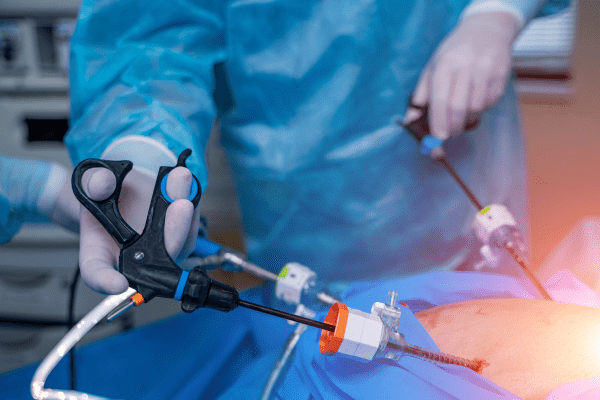Laparoscopic Hernia Surgery
- Home
- Laparoscopic Hernia Surgeon

Are you looking for a trustworthy hernia surgeon in Thrissur who can give you the very best treatment possible? Dr. Arun S. Nair is a highly experienced Gastroenterologist in Thrissur, Kerala, and a hernia expert in Thrissur. Dr. Arun Nair also specializes in hernia repair surgery. Also, he is a hernia repair specialist who has completed 1000+ hernia repair operations using laparoscopy, the most favored and modern surgical technology.
He has proven himself as a top hernia expert in Thrissur because of his remarkable talents, patient-centered approach, and passion for giving the best possible care. Dr. Arun S. Nair provides top-notch hernia therapy in Thrissur, Kerala, as well as customized care for all patients struggling with all forms of hernia issues. Schedule an appointment with Dr. Arun Nair now and take your first step towards a healthy, hernia-free life.
Today we are going to gain knowledge about what is hernia surgery, the types of hernia surgery, benefits of the hernia surgery, and the cost of hernia surgery in Thrissur.
What is Hernia?
A hernia is a medical condition in which an internal structure, such as a part of the intestine or abdominal tissue, bulges through a weakened area in the muscle or connective tissue. This bulge can be visible or felt under the skin and is usually more pronounced when standing or during physical exertion. Hernias are commonly found in the abdominal region, but they can also occur in other parts of the body.
Types of the Hernias :
- Inguinal Hernia: The most common kind of hernia occurs in the groin region. It is more prevalent in men. Inguinal hernias are further divided into two types:
- Direct Inguinal Hernia: This hernia happens when a section of the intestine pushes through a weak spot in the abdominal wall near the inguinal canal.
- Indirect Inguinal Hernia: This hernia happens when a part of the intestine pushes into the inguinal canal, a channel that ordinarily gives the testicles to descend into the scrotum through development.
- Femoral Hernia: A femoral hernia is a protrusion in the upper thigh near the groin that develops below the inguinal ligament, however, it is more frequent in women. It occurs when a part of the intestine passes through the femoral canal, a tiny hole near the top of the thigh. Because of the high danger of issues, a femoral hernia requires prompt surgery.
- Incisional Hernia: This hernia forms at the site of an earlier surgical incision. When the abdominal wall weakens or divides around the surgical scar, organs or tissues protrude.
- Umbilical Hernia: A hernia of the umbilicus arises near the belly button (umbilicus). It is more frequent in newborns, but it may also impact adults, particularly pregnant women and people who are overweight. Hernia repair surgery is essential because the hernia can expand and become strangulated, which can be harmful.
- Hiatal Hernia: The hiatal hernia develops at the entrance of the abdomen, which is placed in between the stomach and the chest. With this hernia, the stomach bulges into the chest location. Hiatal hernias are classified as either para esophageal or sliding. In a paraesophageal hernia, the stomach pushes through the opening and lays next to the esophagus. This condition may produce a strangulated hernia because the supply of blood is likely to be blocked off. The sliding hernia, on the other hand, is the most common form. In this position, both the stomach and the lower part of the esophagus enter the chest through the abdomen and settle there.
What are the Signs and Symptoms of Hernia?
- Visible Bulge: The primary sign or symptom of the hernia is a bulge in the area that is affected. This bulge is more visible when you are standing and coughing, but it may go away when you lie down. When a patient gets an inguinal hernia, he gets a bulge in the groin.
- Discomfort and Pain: Hernias can produce various levels of pain and discomfort. Around the center of the bulge, you may feel a dull discomfort, pressure, or burning sensation. Physical activity, lifting items, and even coughing and sneezing can increase the pain.
- Changes in intestine habits: Some of the hernias, especially ones that affect the abdomen, might cause bowel changes. You may suffer from constipation, difficulties in urinating, or even bowel blockages.
- Nausea and Vomiting: In serious cases, nausea and vomiting are seen in the patient. This can especially happen when a hernia gets stuck and causes a blockage in the intestine. If you suffer from persistent nausea and vomiting, it’s important to seek proper medical treatment.
- Discomfort in the Chest: In this type of situation, the symptoms are chest burn, heartburn, and difficulty swallowing. This type of symptom indicates that the patient has hiatal hernias, which occur in the upper part of the stomach.
What are the causes of Hernia?
According to Dr. Arun S. Nair, a famous hernia surgeon in Thrissur, Kerala, A hernia occurs when pressure forces an organ or tissue out of a patient’s abdomen through a hole or a weak muscle. This sensitive area may have been present since birth or come out later in life.
Any abdominal pressure can create a hernia, which can develop in the following situations:
- A congenital disorder that arises during pregnancy and exists from birth.
- Trying to lift big items without enough abdominal muscular support
- Weak abdominal wall
- Family history
- High pressure in the abdomen
How is Hernia Diagnosis?
Hernias are normally diagnosed by a physical examination, a study of the patient’s medical history, and, in certain cases, further diagnostic testing. The following are the most popular ways to detect a hernia:
- Physical Examination: Arun S. Nair will start by examining the patient’s physical condition to check the presence of a hernia. During this examination Dr. Arun S. Nair will check the area that is affected thoroughly, looking for visual indicators of hernia-like bulges or abnormalities in the abdomen or groin region. They may instruct the patient to cough, stretch, or stand to more accurately assess how the hernia responds to various pressures.
- Patient Medical History: Arun S. Nair, a hernia specialist in Thrissur, will ask you questions about your symptoms, such as when they began, any activities that cause them, and whether there is a family history of hernias. They will also inquire about any previous operations or injuries that might have caused the formation of a hernia.
- Imaging tests: In some cases, physical examination and patient medical history are not sufficient. Dr. Arun S. Nair may recommend to patients to take imaging tests to confirm the diagnosis. These tests include:
- Ultrasound: A non-invasive treatment that creates pictures of the hernia and its surrounding tissues using vibrations. Ultrasound can assist in determining the exact position and dimensions of the hernia.
- MRI (Magnetic Resonance Imaging): MRI scans provide high-resolution pictures of the soft tissues, which help in the precise identification of hernias, especially in complicated instances.
- CT (Computed Tomography) Scan: This advanced scanning approach generates comprehensive cross-sectional pictures of the human body, allowing hernia experts to view the hernia and its connection to surrounding tissues.
The combination of a medical history, physical examination, and imaging tests (if necessary) assists in the proper diagnosis of a hernia and the determination of its type, size, and possible consequences. Dr. Arun S. Nair can then prescribe suitable treatment choices while talking about possible risks and benefits with you based on the diagnosis.
Hernia Treatment Options:
- Open Hernia Repair: This is the traditional approach for hernia treatment. It involves making an incision at the hernia site, pulling the protruding tissue back into place, and strengthening the weakening abdominal wall with sutures or mesh the usual technique.
- Laparoscopic Hernia Repair: A tiny tube containing a camera (laparoscope) and surgical equipment is placed via tiny cuts in this procedure that is minimally invasive. While examining the region on a screen, the surgeon employs these instruments to repair the hernia.
- Robotic Hernia Repair: Robotic hernia repair is an innovative procedure that addresses hernias with accuracy and little invasiveness by utilizing modern robotic technology. This novel strategy has gained popularity due to the various advantages it provides over traditional approaches.
Benefits of Laparoscopic Surgery
- Less post-operative pain: Smaller incisions result in reduced pain and discomfort during the recovery period.
- Faster recovery and shorter hospital stay: Minimally invasive techniques promote quicker healing, allowing patients to return to their daily routines sooner.
- Smaller incisions and reduced scarring: The tiny incisions used in laparoscopic surgery lead to minimal scarring and improved cosmetic outcomes.
- Lower risk of wound infections and complications: The smaller incisions reduce the risk of infections and other surgical complications.
- Quicker return to daily activities and work: Patients can resume their normal activities faster, promoting a better quality of life.
- Less Blood Loss: With laparoscopic surgery blood loss can be minimum
Cost of hernia Surgery in Thrissur?
Cost of Hernia surgery depends on various factors like facilities provided by the hospital, Robotic system used by the hospital, Complexity of the surgery and also the experience of the surgeon in the field. The following are the multiple factors that affect the cost of the Hernia surgery in Thrissur.
Why Choose Dr. Arun Nair for Hernia Surgery?

Vast Experience
Dr. Arun Nair is well-known for his wide knowledge and achievements in the field of laparoscopic surgery. He currently serves as a Senior Consultant in the Department of Surgical Gastroenterology and Advanced Laparoscopic Surgery

Expertise
Dr. Arun S Nair has expertise in performing laparoscopic surgery for multiple condition such as hernia, gallstone, cancer surgery, HPB surgery. He performed more than thousands of laparoscopic surgery.

Handling Complex Cases
Throughout his distinguished career, he has effectively handled and treated hundreds of complicated patients. His colleagues and patients hold him in high regard for his remarkable surgical abilities and expertise.

Patient-Centric Approach
Dr. Arun Nair prioritizes patient well-being and safety, ensuring that each procedure is tailored to the individual's needs and circumstances.

State-of-the-Art Facilities
Dr. Arun Nair's practice is equipped with the latest technology, allowing for the highest standard of laparoscopic surgical interventions.

Location Accessbility
Dr. Arun S Nair avaialbe at Exclir Clinic, Thrissur, Daya General Hospital and St. Gregorios Medical Mission Multi-Speciality Hospital. So patient can easily choose hospital as their conveience.
Book an Appointment
To schedule an appointment for laparoscopic hernia surgery with Dr. Arun Nair, you can call the provided appointment phone numbers +91 953 99 88886 or +91 8129537070. Alternatively, you can visit the mentioned hospital addresses during their specified timings to book an appointment in person.
Frequently Asked Questions (FAQ's):
Dr. Arun S Nair is the best hernia surgeon in Thrissur, Kerala. Dr. Nair has 13 years of experience in hernia surgery he has expertise in Laparoscopic surgery and robotic surgery.
Hernia treatment depends on the condition of the patient as per the patient’s medical condition and severity of the hernia and also the treatment that is suitable for the patient according to their health.
A strangulated hernia, if ignored, may result in serious diseases such as necrotizing enterocolitis (severe intestinal inflammation) and sepsis.
Yes. Hernia surgery is a secure and efficient method of treating hernias.
Yes, most patients continue to their usual lives following hernia surgery after they have fully recovered.
Yes, if you have any symptoms for the hernia, consulting the hernia specialist will prevent the hernia, But need to visit the specialist as soon as possible.
The cost of hernia surgery in Thrissur varies based on the type of hernia, surgical method, and hospital services. To obtain an exact cost estimate, it is best to contact Dr. Arun S. Nair.
Google Review
EXCELLENTTrustindex verifies that the original source of the review is Google. Dr. Arun S. Nair is an exceptional surgeon whose expertise and dedication were evident throughout my father’s treatment. From the very first consultation, he took the time to explain the procedure in detail, addressing all our concerns with patience and clarity. His calm and confident approach reassured us that my father was in the best hands. During the surgery and recovery process, he remained attentive, ensuring everything went smoothly and that my father was comfortable. His professionalism, skill, and genuine concern for his patients make him a truly outstanding doctor. Leena, was equally remarkable. She was always available to answer our questions, provide updates, and offer emotional support. Her warmth and kindness made a huge difference, not just for my father but for our entire family. She treated us with care and respect, making sure we felt heard and supported every step of the way. Together, Dr. Nair and Leena create a team that goes above and beyond for their patients. We are incredibly grateful for their care and would highly recommend them to anyone in need of medical treatment. Susanna Parackal Varghese D/O P T VargheseTrustindex verifies that the original source of the review is Google. We’ve had an amazing experience with Dr. Arun S. Nair. When my dad got sick, I found Arun online and reached out to his assistant. He has been nothing but exceptional in patient care. He did a very long and complicated gastral surgery on my dad and he came out of it perfectly fine. Dr Arun, his associates Dr Aishwarya and Leena are very talented people and great at supporting the patient throughout the process. I was constantly in touch with all of them over the phone and they were very helpful to all of us. If you have any gastric related issues, please always go to Dr Arun.Trustindex verifies that the original source of the review is Google. Good treatmentTrustindex verifies that the original source of the review is Google. Dr. Arun S Nair is a skilled gastro surgeon known for his kindness and politeness towards patients.Trustindex verifies that the original source of the review is Google. I was a surgery patient here. It was nice experience and feeling goodTrustindex verifies that the original source of the review is Google. നല്ലത്Trustindex verifies that the original source of the review is Google. Right after the first consultation with Dr.Arun S Nair I gained confidence to do my hernia surgery and decided to get it done by Dr.Arun S Nair himself. Surgery was successful and I recovered within the time as previously told in the first consultation.Trustindex verifies that the original source of the review is Google. Dr. Arun S Nair totally impressed us during our first meet in February 2023 regarding my mother's surgery. Dr Arun gives courage, confidence and the way he treats patients, maybe beacause of all this I didn't have any tension. He is very friendly with everyone. I'm very satisfied with his approach. Dr. Arun S Nair is one of the best Gastro Surgeon in Kerala.Thanks again to Dr Arun sir . Special thanks goes to sister Rachel for her continuous support and assistance throughout our stay.Trustindex verifies that the original source of the review is Google. I am very satisfied and happy. Dr Arun totally impressed us during our first meet.Very happy with the friendly and compassionate aproach. All the staffs are very supportive. Thank you sir

